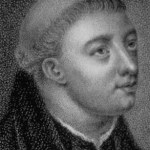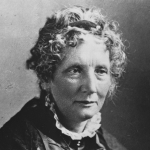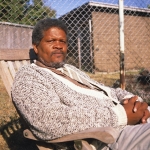Beholde, o man! lyft up thyn eye and see
What mortall peyne I suffre for thi trespace.
With pietous voys I crye and sey to the:
Beholde my woundes, behold my blody face,
Beholde the rebukes that do me so manace,
Beholde my enemyes that do me so despice,
And how that I, to reforme the to grace,
Was like a lambe offred in sacryfice.
...
And geyn thi pryde behold my gret mekenesse;
Geyn thyn envie behold my charité;
Geyn thi leccherye behold my chast clennesse;
Geyn thi covetyse behold my poverté.
Atweene too thevys nayled to a tree,
Rayled with reed blood, they lyst me so desguyse,
Behold, O man! all this I did for the,
Meke as a lambe offred in sacryfice.
Behold my love, and gyf me thyn ageyn;
Behold, I deyde thy raunsom for to paye.
Se howe myn herte is open brode and pleyn,
Thy gostly enemyes onely to affraye.
An hardere batayle no man myght assaye,
Of all tryumphes the grettest hye empryse.
Wher-for, O man! no lenger to dismaye,
I gaf for the my blood in sacryfice.
Turne home ageyn, thy synne do forsake.
Behold and se yf ought be left behynde,
How I to mercy am redy the to take.
Gyf me thyn herte and be no more unkynde;
Thy love and myn, togedyr do hem bynde,
And late hem never departe in any wyse.
Whan thou were lost, thy sowle ageyn to fynde,
My blod I offred for the in sacryfice.
Emprente thes thynges in thyn inward thought,
And grave hem depe in thy remembraunce;
Thynke on hem, and forgete hem nowght.
Al this I suffred to do the allegeaunce,
And with my seyntes to yeve the suffisaunce,
In the hevenly court for the I do devyse
A place eternall, a place of all plesaunce;
For which my blood I gaf in sacryfice.
And more my mercy to putte att a preef,
To every synnere that non ne shal it mysse,
Remembre how I gaf mercy to the theef
Which hadde so longe trespaced and doon amys;
Went he not frely with me to paradise?
Have this in mende, how it is my guyse
All repentaunt to bryng hem to my blysse,
For whom my blood I gaf in sacryfice.
Tarye no lenger toward thyn herytage;
Hast on thy weye and be of ryght good chere.
Go eche day onward on thy pylgrymage;
Thynke howe short tyme thou hast abyden here.
Thy place is bygged above the sterres clere,—
Noon erthly palys wrought in so statly wyse.
Kome on, my frend, my brother most entere!
For the I offered my blood in sacryfice!



















Comment form: